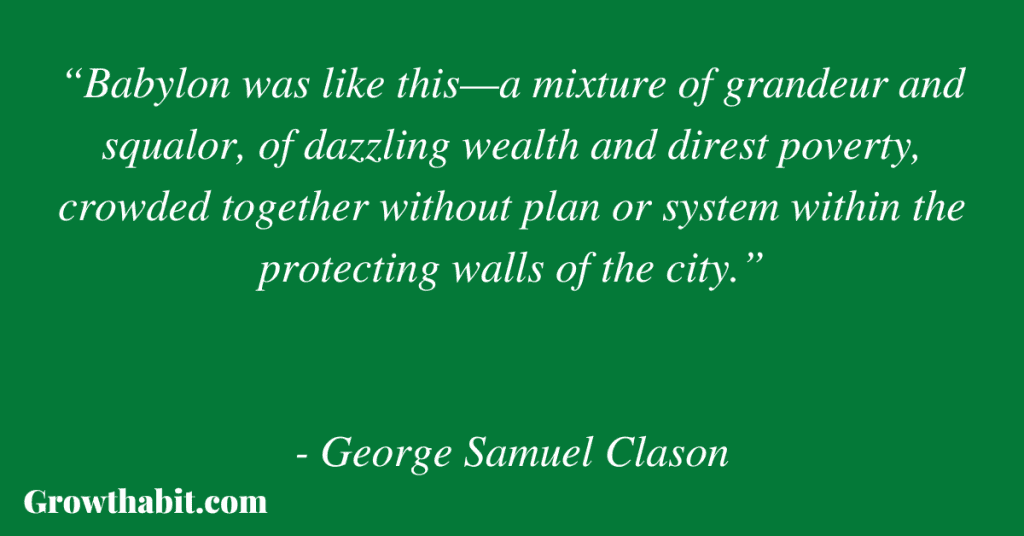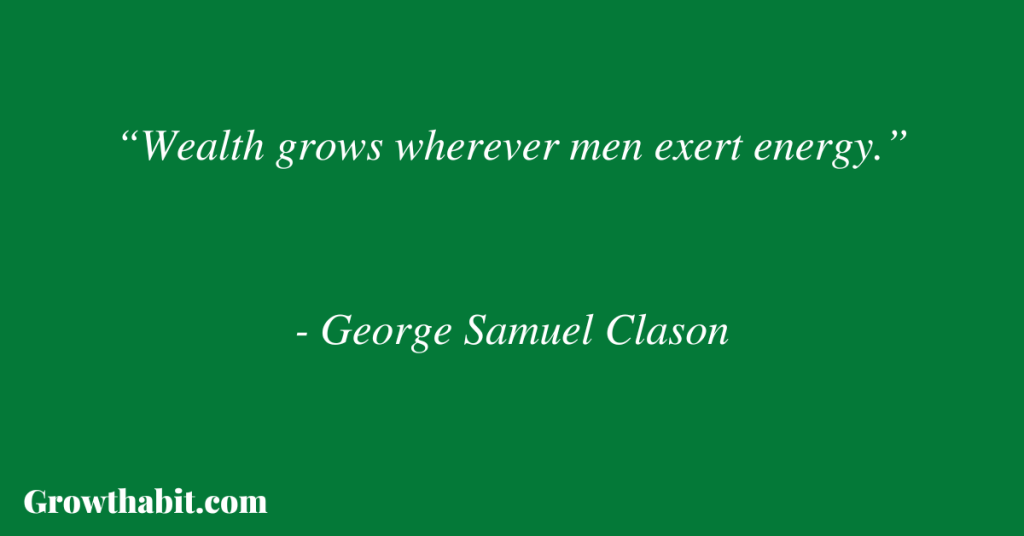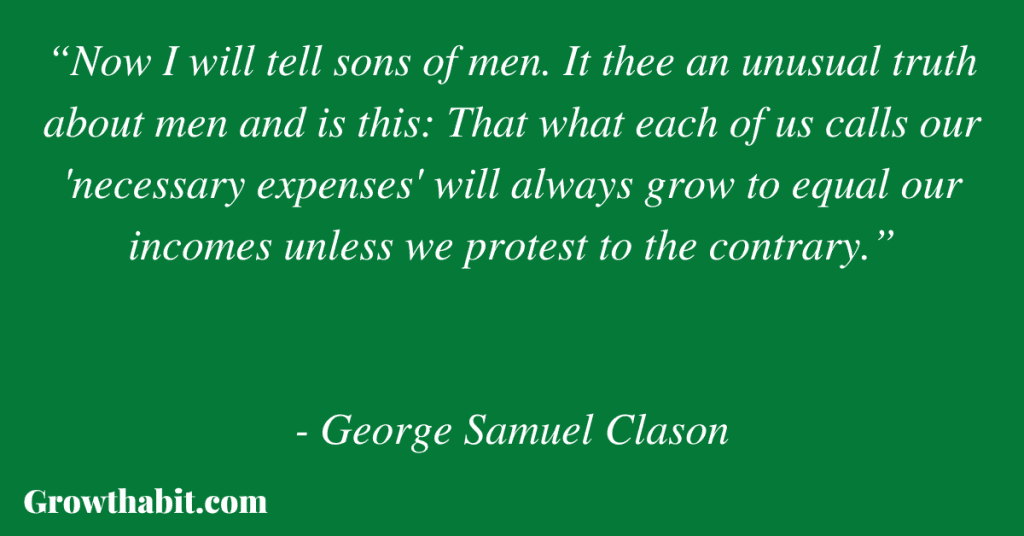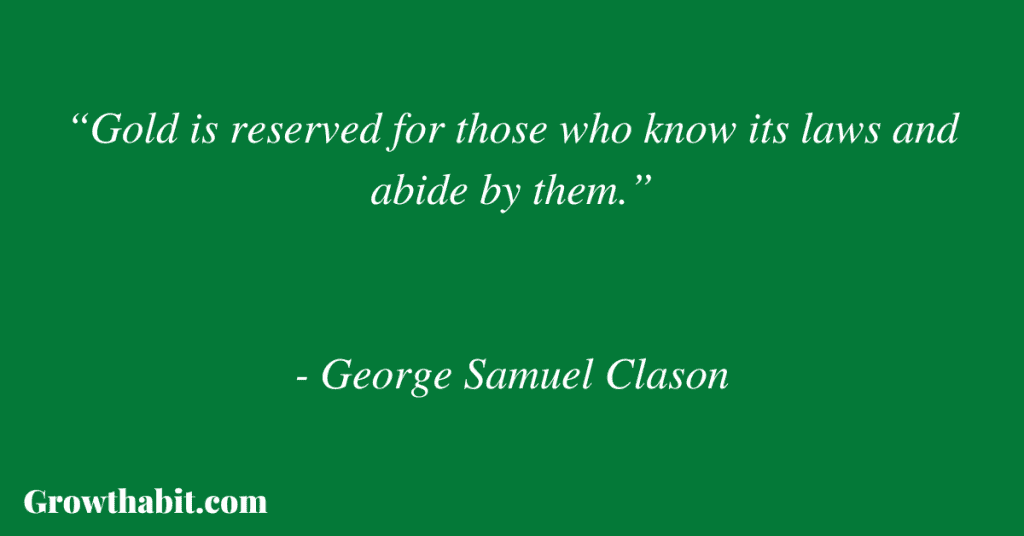The Richest Man in Babylon by George S. Clason is an ancient book that offers a universal recipe for today’s most-asked question – how to become wealthy?
Book Title: The Richest Man in Babylon
Author: George Samuel Clason
Date of Reading: Dec 2022
Rating: 9/10
What Is Being Said In Detail:
This book talks about culture and living in the 20th century in Babylon, the cradle of the fundamental financing principle conceived 8000 years ago.
The fact that makes this book even more interesting to read is that you have stories about money and its value from different perspectives: ordinary people, slaves, as well as divas.
Besides, a few chapters provide clear instructions and rules about money, sales, expenses and savings, the balance between these two, and so on… Since these rules are universal and extremely simple, it is not just possible, but it ought to implement the same thing today in our lives.
The book is composed of eleven chapters, and each of them brings a different, interesting story and characters.
Foreword explains the difference between today’s world and the past, delivering the reason why Babylon was the wealthiest city in the world for so many years.
Chapter One: “The Man Who Desired Gold”
Chapter 1 talks about the chariot builder of Babylon who was wondering why he cannot have the same goods as his old friend, the richest man in Babylon when they had the same predispositions in youth.
He realized he had been working hard all this time and had some talent for chariot building, but his budget was only enough for basic life needs. So, he decided to visit his friend and ask him the same question he was asking himself.
Chapter Two: “The Richest Man in Babylon”
Chapter 2 is about a wealthy man named Arkad and his path to that wealth. Here you can find plenty of advice about saving and spending money and reframing your thinking of money.
The main thing Arkad was saying to his friend is thoughts about the money you earn. You need to know that you are making money for yourself, not for bills, food, or clothes.
So, you have the right to keep one part of it and wisely decide what to do with that money; how to make that small part grow and work for you?
Chapter Three: “Seven Cures for a Lean Purse”
Chapter 3 clearly defines seven rules for saving and increasing your money. Also, this chapter shows different stories about Babylon residents, their way of investing money, and family care.
Even more important can be the part about mistakes and losing money, so better learn from someone else’s than your own!
Here are the rules: Start thy purse to fattening, Control thy expenditures, Make thy gold multiply, Guard thy treasures from loss, Make of thy dwelling a profitable investment, Insure a future income, Increase thy ability to earn.
Chapter Four: “Meet the Goddess of Good Luck”
Chapter 4 will destroy your prejudice about “pure luck” without hard-working. There is a speech about luck as a growth opportunity, not the finished product because all luck in the world cannot help procrastinators succeed.
Chapter Five: “The Five Laws of Gold”
Chapter 5 is a story about the son and a wealthy father who is determined to test his son’s skills and improve his wisdom. He gave him rules for the treatment of money and time to prove he was worthy of inheritance.
You can find all five laws deeply explained with examples in this chapter. These are the five laws:
1. Gold cometh gladly and in increasing quantity to any man who will put by not less than one-tenth or his earnings to create an estate for his future and that or his family.
2. Gold laboureth diligently and contentedly for the wise owner who finds for it profitable employment, multiplying even as the flocks of the field.
3. Gold clingeth to the protection of the cautious owner who invests it under the advice of men wise in its handling.
4. Gold slippeth away from the man who invests it in businesses or purposes with which he is not familiar or which are not approved by those skilled in its keep.
5. Gold flees the man who would force it to impossible earnings or who followeth the alluring advice of tricksters and schemers or who trusts it to his own inexperience and romantic desires in investment.
Chapter Six: “The Gold Lender of Babylon”
Chapter 6 provides the situation where you need to choose between logic and emotion when it comes to money lending. The most experienced lender of Babylon tells you his advice: to whom should you lend your money?
How to be sure that people will return what they borrowed? Get to know that person, and ask her what she would do with borrowed money and how she can be sure she can return that amount to you. Do they have any property? Do they have the capacity to earn?
Chapter Seven: “The Walls of Babylon”
Chapter 7 describes one attempt at looting Babylon and once again proving its security. The walls of Babylon protected her citizens, walls whose construction required an enormous amount of money.
Chapter Eight: “The Camel Trader of Babylon”
Chapter 8 is a little bit different story about loans and methods of retrieving them. This part of the book highlights the difference between a slave and a free man, and what would each of them will do in a situation without any money source.
Chapter Nine: “The Clay Tablets from Babylon”
Chapter 9 continues talking about loans, describing in detail the situation from the previous chapter. That story was written on clay tablets and helped lost students to find their way out of financial problems.
Chapter Ten: “The Luckiest Man in Babylon”
Chapter 10 also talks about slaves and freedom, but this time from the slave’s point of view. It highlights the importance of work and patience. You cannot find a way to freedom without putting effort and knowing that luck is the state of mind at the first point.
Chapter Eleven: “A Historical Sketch of Babylon”
Chapter 11, at the very end, gives you a detailed description of the origin of Babylon through history and how one city at that time could have or find all innovation for a living, business, and enjoyment.
Most Important Keywords, Sentences, Quotes:
FOREWORD:
“Babylon became the wealthiest city of the ancient world because its citizens were the richest people of their time. They appreciated the value of money.
They practiced sound financial principles in acquiring money, keeping money and making their money earn more money. They provided for themselves what we all desire . . . incomes for the future.”
CHAPTER ONE: “The Man Who Desired Gold”
“Babylon was like this—a mixture of grandeur and squalor, of dazzling wealth and direst poverty, crowded together without plan or system within the protecting walls of the city.”

“Why, indeed! Because when I awoke and remembered how empty was my purse, a feeling of rebellion swept over me. Let us talk it over together, for, as the sailors do say, we ride in the same boat, we two.
As youngsters, we went together to the priests to learn wisdom. As young men, we shared each other’s pleasures. As grown men, we have always been close friends. We have been contented subjects of our kind. We have been satisfied to work long hours and spend our earnings freely.
We have earned much coin in the years that have passed, yet to know the joys that come from wealth, we must dream about them. Bah! Are we more than dumb sheep? We live in the richest city in all the world. The travellers do say none equals it in wealth.
About us is much display of wealth, but of it we ourselves have naught. After half a lifetime of hard labour, thou, my best of friends, hast an empty purse and sayest to me, ‘May I borrow such a trifle as two shekels until after the noblemen’s feast this night?’
Then, what do I reply? Do I say, ‘Here is my purse; its contents will I gladly share?’ No, I thine. What is admit that my purse is as empty as the matter? Why cannot we acquire silver and gold—more than enough for food and robes?”
CHAPTER TWO: “The Richest Man in Babylon”
“In old Babylon there once lived a certain very rich man named Arkad. Far and wide he was famed for his great wealth. Also was he famed for his liberality. He was generous in his charities.
He was generous with his family. He was liberal in his own expenses. But nevertheless each year his wealth increased more rapidly than he spent it.”
“Wealth is a power. With wealth many things are possible:
-One may ornament the home with the richest of furnishings.
-One may sail the distant seas.
-One may feast on the delicacies of far lands.
-One may buy the ornaments of the gold worker and the stone polisher.
-One may even build mighty temples for the Gods.
-One may do all these things and many others in which there is delight for the senses and gratification for the soul.”
“As for study, did not our wise teacher teach us that learning was of two kinds: the one kind being the things we learned and knew, and the other being the training that taught us how to find out what we did not know?”
“Then he looked at me shrewdly from under his shaggy brows and said in a low, forceful tone, ‘I found the road to wealth when I decided that a part of all I earned was mine to keep. And so will you.’”
“’Wealth, like a tree, grows from a tiny seed. The first copper you save is the seed from which your tree of wealth shall grow. The sooner you plant that seed the sooner shall the tree grow.
And the more faithfully you nourish and water that tree with consistent savings, the sooner may you bask in contentment beneath its shade.’”
“When I set a task for myself, I complete it. Therefore, I am careful not to start difficult and impractical tasks, because I love leisure.” When I set a task for myself, I complete it. Therefore, I am careful not to start difficult and impractical tasks, because I love leisure.”
“Wealth grows wherever men exert energy.”
“I advise that you take the wisdom of Algamish and say to yourselves, ‘A part of all I earn is mine to keep.’ Say it in the morning when you first arise. Say it at noon. Say it at night. Say it each hour of every day. Say it to yourself until the words stand out like letters of fire across the sky.”
“Enjoy life while you are here. Do not overstrain or try to save too much. If one-tenth of all you earn is as much as you can comfortably keep, be content to keep this portion.
Live otherwise according to your income and let not yourself get niggardly and afraid to spend. Life is good and life things worthwhile and things to enjoy.”
CHAPTER THREE: “Seven Cures for a Lean Purse”
“The king was thoughtful for some time. Then he asked, “Why should so few men be able to acquire all the gold?” “Because they know how,” replied the Chancellor.”
“Now I will tell sons of men. It thee an unusual truth about men and is this: That what each of us calls our ‘necessary expenses’ will always grow to equal our incomes unless we protest to the contrary.”
“[..] and last remedy for a lean purse is to cultivate thy own powers, to study and become wiser, to become more skillful, to so act as to respect thyself.”
CHAPTER FOUR: “Meet the Goddess of Good Luck”
“If a man be lucky, there is no foretelling the possible extent of his good fortune. Pitch him into the Euphrates and like as not he will swim out with a pearl in his hand. (Babylonian proverb)”
“[…] In this tale we see how good luck waits to come to that man who accepts opportunity.”
“From our discussion have I learned that to attract good luck to oneself, it is necessary to take advantage of opportunities. Therefore, in the future, I shall endeavour to make the best of such opportunities as do come to me.”
CHAPTER FIVE: “The Five Laws of Gold”
“Gold is reserved for those who know its laws and abide by them.”
“[…] ‘This I do to prove to thee, my father, of how much greater value I consider thy wisdom than thy gold. Yet, who can measure in bags of gold, the value of wisdom?
Without wisdom, gold is quickly lost by those who have it, but with wisdom, gold can be secured by those who have it not, as these three bags of gold do prove.”
CHAPTER SIX: “The Gold Lender of Babylon”
“Can this be so? Rodan, the spearmaker, doth display more cunning than all the rest, for he comes Mathon, not for gold, but for come to me for gold to pay for to advice.
Many men their follies, but as for advice, they want it not. Yet who is more able to advise than the lender of gold to whom many men come in trouble?”

“My friend,” resumed Mathon, ” ’tis a worthy subject thou bringest to discuss. Gold bringeth unto its possessor responsibility and a changed position with his fellow men.
It bringeth fear lest he lose it or it be tricked away from him. It bringeth a feeling of power and ability to do good. Likewise, it bringeth opportunities whereby his very good intentions may bring him into difficulties.”
“The chest tells you, Rodan, that humans in the throes of great emotions are not safe risks for the gold lender.”
“Ere thou goest read beneath this which I have carved the lid of my token box. It applies equally to the borrower and the lender: BETTER A LITTLE CAUTION THAN A GREAT REGRET”
CHAPTER SEVEN: “The Walls of Babylon”
“The walls of Babylon had once again mighty and repulsed a vicious foe determined to loot her rich treasures and to ravish and enslave her citizens.”
CHAPTER EIGHT: “The Camel Trader of Babylon”
“Where the determination is, the way can be found, Dabasir replied. “I now had the determination so I set out to find a way.”
CHAPTER NINE: “The Clay Tablets from Babylon”
“My dear Professor: If, in your further digging into those ruins of Babylon, you encounter the ghost of a former resident, an old camel trader named Dabasir, do me a favour.
Tell him that his scribbling upon those clay tablets, so long ago, has earned for him the lifelong gratitude of a couple of college folks back here in England.”
“He had a real message for fellow sufferers, a message so important that after five thousand years it has risen out of the ruins of Babylon, just as true and just as vital as the day it was buried.”
CHAPTER TEN: “The Luckiest Man in Babylon”
“Megiddo felt that we would soon part When no buyers were near, he talked to me earnestly to impress upon me how valuable work would be to me in the future: ‘Some men hate it. They make it their enemy.
Better to treat it like a friend, make thyself like it. Don’t mind because it is hard. If thou thinkest about what a good house thou build, then who cares if the beams are heavy and it is far from the well carry the water thou get for the plaster.
Promise me, boy, if thou get a master, work for him as hard as canst. If he does not appreciate all to do, never mind. Remember, work, well-done, does good to the man who does it. It makes him a better man.’”

“That night I was so excited over my success I could hardly sleep and tried to figure how much I could earn in a year and how many years would be required to buy my freedom.”
“Work, thou see, by this, in the time of my greatest distress, didst prove to be my best friend. My willingness to work enabled me to escape from being sold to join the slave gangs upon the walls.”
CHAPTER ELEVEN: “A Historical Sketch of Babylon”
“Many scientists consider the civilization of Babylon and other cities in this valley to be the oldest of which there is a definite record. Positive dates have been proved reaching back 8000 years.”
“One of the outstanding wonders of Babylon was the immense walls surrounding the city. The ancients ranked them with the great pyramid of Egypt as belonging to the ‘seven wonders of the world.’”
“Babylon was never entered by hostile armies until about 540 years before the birth of Christ. Even then the walls were not captured. The story of the fall of Babylon is most unusual.
Cyrus, one of the great conquerors of that period, intended to attack the city and hoped to take its impregnable walls. Advisors of Nabonidus, the King of Babylon, persuaded him to go forth to meet Cyrus and give him battle without waiting for the city to be besieged.
In the succeeding defeat to the Babylonian army, it fled away from the city. Cyrus, thereupon, entered the open gates and took possession without resistance.”

“The eons of time have crumbled to dust the proud walls of its temples, but the wisdom of Babylon endures.”
Book Review (Personal Opinion):
This book changed my perception of money and financial success. I always thought that making money was a difficult thing to do and required a lot of risks of failure.
In the end, this book proves that making money can’t be easier if you follow simple steps and listen to advise from wise and expert people in your business field.
My favorite thing about this book is the opportunity to learn through the main character, Arkad, story. Remembering his path, wise and stupid steps, and as the result, you can grow even faster while avoiding those mistakes.
The only reason why I didn’t give it a ten rate is because I sometimes felt there were too many similar stories, repeating the content from the previous ones.
Rating: 9/10
This Book Is For:
- Young and ambitious man who is passionate about material success
- Rich man who doesn’t know where to invest his money
- Researchers and historians who study economics and archeology
If You Want To Learn More
Here’s the full audio version of the book:
The Richest Man in Babylon- George S. Clason (FULL VERSION)
How I’ve Implemented The Ideas From The Book
As I already said, the book changed my way of thinking. Knowing the exact step of how to make money, now I only need to start. The first step, of course, is saving.
I am up to doing it once more in my life, but this time knowing without fear that it cannot negatively affect spending because I learned how to control it.
One Small Actionable Step You Can Do
It is hard to say “small step” because every step from this book is necessary. It can be silly doing just one part of the mentioned steps, but it is just an opportunity to learn and keep going.
Reading this book, you will ask yourself how much money you spent last year or month and for what? Be honest with yourself, you could spend less if you have had less, and you could spend more if you have had more.
So, that is the point – start thinking about your future and your family. What do you have to leave them?

